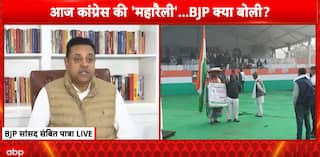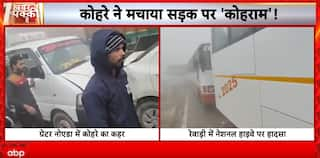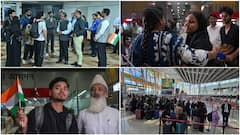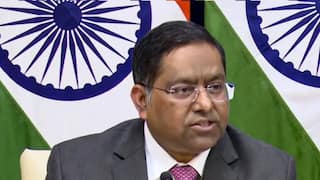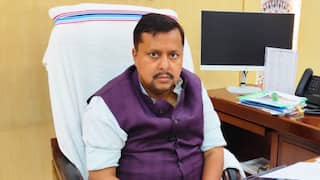PM Modi Op-Ed: India-Japan To Continue Building Open, Free And Inclusive Indo-Pacific Region
Prime Minister Modi, who is in Japan on a two-day visit to attend a summit of the Quad leaders, penned an op-ed on the vibrant relations between India and Japan in the Yomiuri Shimbun newspaper.

Tokyo: India and Japan will contribute towards building an open, free and inclusive Indo-Pacific region, connected by secure seas, integrated by trade and investment, defined by the respect of sovereignty and territorial integrity and anchored in international law, Prime Minister Narendra Modi said in an op-ed published in a leading Japanese newspaper on Monday.
Prime Minister Modi, who is in Japan on a two-day visit to attend a summit of the Quad leaders at the invitation of his Japanese counterpart Fumio Kishida, penned an op-ed on the vibrant relations between India and Japan in the Yomiuri Shimbun newspaper.
As two democracies, strategically located in the Indo-Pacific region, we can be important pillars of a stable and secure region. That is why our partnership is expanding across a broad range of areas, he said.
Our defence ties are growing rapidly, from exercises and information exchanges to defence manufacturing. We are doing more in cyber, space and underwater domains, Modi said in the op-ed titled India-Japan: A Partnership for Peace, Stability and Prosperity'.
Penned an op-ed on the vibrant relations between India and Japan. Ours is a partnership for peace, stability and prosperity. I trace the journey of our special friendship which completes 70 glorious years. @Yomiuri_Online https://t.co/nXx8y3qiQL
— Narendra Modi (@narendramodi) May 23, 2022
He said that India and Japan will also contribute towards building an open, free and inclusive Indo-Pacific region, connected by secure seas, integrated by trade and investment, defined by the respect of sovereignty and territorial integrity and anchored in international law, he wrote, amidst China's aggressive actions in the region.
China has territorial disputes with many countries in the strategic Indo-Pacific region.
The Chinese government claims nearly all of the disputed South China Sea, though Taiwan, the Philippines, Brunei, Malaysia, and Vietnam claim parts.
Beijing has built artificial islands and military installations in the South China Sea. It is also involved in a maritime dispute with Japan over the East China Sea.
Besides security, together and with like-minded partners in the region and beyond, in institutions and arrangements like Quad, we are promoting initiatives for development, infrastructure, connectivity, sustainability, health, vaccines, capacity building and humanitarian disaster response in the region, Prime Minister Modi said.
A peaceful and prosperous Indo Pacific region will be critical for a better future for the entire world, he said.
Special. Strategic. Global. Each of these three words that describe the India-Japan partnership has a unique significance, yet they fall well short of the true potential of our ties, Modi said.
In a tweet, he said: Penned an op-ed on the vibrant relations between India and Japan. Ours is a partnership for peace, stability and prosperity. I trace the journey of our special friendship which completes 70 glorious years. @Yomiuri_Online .
Closer India-Japan cooperation is vital in the post-COVID world. Our nations are firmly committed to democratic values. Together, we are key pillars of a stable and secure Indo-Pacific region. I am equally glad that we are working closely in various multilateral forums as well.
I have had the opportunity of regularly interacting with the Japanese people since my days as Gujarat CM. Japan's developmental strides have always been admirable. Japan is partnering India in key sectors including infrastructure, technology, innovation, start-ups and more, he said in a series of tweets.
In the op-ed, Prime Minister Modi said cultural ties that go back centuries; a firm shared belief in the values of democracy, freedom, and a rules-based international order, as well as convergence in the regional and global outlook, are the bedrock of ties between India and Japan as trusted and natural partners.
From Bodhisena to Swami Vivekananda, India-Japan cultural ties have a long and rich history of mutual respect and learning from one another, he said.
Among Mahatma Gandhi's cherished personal possessions were small statues of Mizaru, Kikazaru and Iwazaru, the Three Wise Monkeys, he said.
Justice Radha Binod Pal is a well-known name in Japan, and Gurudev Tagore's admiration for Japan and interaction with Okakura Tenshin were instrumental in forging early connections between artists and intellectuals on both sides, according to Modi.
These deep links laid a strong foundation for a modern India-Japan partnership that continues to blossom even as we celebrate the 70th anniversary of the establishment of formal diplomatic ties, he said.
Prime Minister Modi said that his own conviction about this partnership began in his early days as Chief Minister of Gujarat.
It was not just the sophistication of Japanese technology and skills, but also the seriousness and long-term commitment of Japan's leadership and businesses, that made Japan Gujarat's preferred industrial partner and the most prominent presence in Vibrant Gujarat Summits since its inception, he said.
Japan has also proved to be an invaluable partner in India's journey on the path of development and modernisation. From the automobile sector to industrial corridors, Japanese investments and development assistance have a truly pan-India footprint, according to Modi.
The iconic Mumbai-Ahmedabad High-Speed Rail project symbolises Japan's extensive collaboration in some of the most important endeavours to build a New India, he said.
We have traversed a long distance since we established diplomatic relations in 1952. In my view, though, the best is yet to come. Today, as both India and Japan look to re-invigorate and refashion our economies in a post-Covid era, there is immense scope to deepen our engagement across the entire spectrum from trade and investment to defence and security, Modi said.
In the last few years, India has embarked on a journey to build a strong foundation for the manufacturing sector, services, agriculture and digital technology infrastructure, he said.
I see Japan as an indispensable partner in India's continuing transformation. For Japan, India's speed and scale combine with the ease of doing business, attractive incentives, bold reforms and ambitious plans to create unmatched opportunities.
We have also fostered a dynamic start-up ecosystem in India, with over 100 unicorns. The Japanese capital is already playing an important role in this effort. And there is potential for a great deal more, he said.
People-to-people links between the two countries have always played an important role in deepening mutual understanding.
Many Indians are now working in Japan and contributing to the Japanese economy and society, just as Japanese executives are contributing to economic development in India.
I am convinced that such complementarities can be enhanced manifold, he said.
The India-Japan partnership has a greater imperative and serves a larger purpose, he said.
The Covid pandemic, global tensions and disruptive challenges to stability and security in the Indo-Pacific region have underlined the need for building resilient supply chains, a human-centric development model and stable and strong international economic relations, capable of resisting coercion and exploitation.
The bilateral partnership will help advance these goals.
Crises tend to magnify challenges and accelerate our transition to the future. For this reason, at this pivotal moment for the world, our partnership now faces larger responsibility and greater urgency. Based on all that we share dearly and all that we have built over decades, India and Japan are ready to respond to this calling, he said.
In Delhi in March 2022, Prime Minister Kishida and I laid out a roadmap for further deepening and broadening the India-Japan Special Strategic and Global Partnership for our countries to cooperate for a peaceful, stable and prosperous post-COVID world.
As we mark 70 years of diplomatic relations, we are also building one of the defining partnerships of our region. I am confident that my meeting with PM Kishida will lead to tangible progress in realising this ambitious agenda, Prime Minister Modi added.
Prime Minister Modi is visiting Tokyo at the invitation of his Japanese counterpart Fumio Kishida.
He will attend the summit of the Quad leaders which is aimed at further bolstering cooperation among the member nations of the influential grouping and discussing developments in the strategic Indo-Pacific region.
Besides Modi, the Quad summit in Tokyo on May 24 will be attended by US President Joe Biden, Japanese Prime Minister Fumio Kishida and Australian prime minister-elect Anthony Albanese.
The Quad or Quadrilateral Security Dialogue comprises India, the US, Japan and Australia.
Modi will hold separate bilateral meetings with Biden, Kishida and Albanese on the sidelines of the summit.










